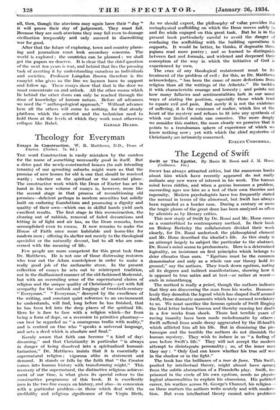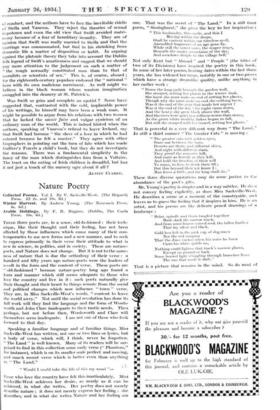The Legend of Swift
Swift or The Egotist. By Mario M. Rossi and J. M. Hone. (Gollancz. 16s.) Swam has always attracted critics, but the numerous books about him which have recently appeared do not really indicate any new wave of interest in his work. The human mind loves riddles, and when a genius becomes a problem, succeeding ages use him as a test of their own theories and ingenuity. Modern psychologists have too frequently stated the normal in terms of the abnormal, but Swift has-always been regarded- as a border ease. During a century or more the tragic gloom of the great dean has been analysed as often by alienists as by literary critics.
This new study of Swift by Dr. Rossi and Mr. Hone comes as a counterblast to contemporary method. In their book on Bishop Berkeley the collaborators divided their work clearly, for Dr. Rossi undertook the philosophical element and Mr. Hone described the idealist's life. As this study is an attempt largely to subject the particular to the abstract, Dr. Rossi's mind seems to predominate. Here is a determined logicality, an insistence on first principles which belongs to drier climates than ours. " Egotism must be the common denominator and only as a whole can our theory hold its ground," say the authors. They track down egotism, noting all its degrees and indirect manifestations, showing how it is opposed to true satire and at best—or rather at worst— ends in misanthropy, The method is really a priori, though the authors indicate that they are discovering the man from his works. Remorse- lessly they demolish the legend which has shaped itself around Swift, those dramatic moments which have seemed revelatory to us. We must sacrifice the famous episode of Swift flinging the fatal letter before Vanessa and thereby causing her death in a few weeks from shock. Those last terrible years of raving insanity have been made melodramatic by others : Swift suffered from senile decay aggravated by the ill-health which afflicted him all his life. But in dismissing the pic- turesque and the terrible the authors do not diminish the human mystery. They wish to induce in us " a feeling of awe before Swift's life." They will not accept the modern attempt to disintegrate personality ; so, of the inner man they say : " Only God can know whether his true self was in the shadow or in the light."
The book has the brilliance of a tour de force. This Swift, posited by intellectual theory, might almost have sprung from the subtle abstraction of a Pirandello play. Swift, im- prisoned in the circle of his own egotism, needs no physio- logical abnormalities to explain his obsessions. His political career, his warfare across St. George's Channel, his religion— on these matters the authors write acutely and with modera- tion. But even intellectual theory cannot solve problems of conduct, and the authors.have to face the inevitable riddle of Stella and Vanessa. They reject the theories of sexual impotence and even the old view that Swift avoided matri- mony because of a fear of hereditary insanity. They are of opinion that Swift was really married to Stella and that the marriage was consummated, but fmd in his shrinking from domestic life- a matter of disposition or habit. . In arguing against the platonic theory they take into account the Dublin folk legend of Swift's amativeness and suggest that we should pay more attention to the judgement on such a matter of " the rough normally constituted man than to that of moralists or scientists of sex." This is, of course, absurd ; for the eighteenth-century populace endowed the " national " hero with its own malicious merriment. As well might we believe in the black woman whom wanton imagination smuggled into the deanery at St. Patrick's.
Was Swift so grim and complete an egotist ? Some have suggested that, contrasted with the cold, implacable power of his writings, he himself may have been a weak man. It might be possible to argue from his relations with two women that he lacked the savoir faire and vulgar cynicism of an ordinary man of the world. This is indeed hinted when the authors, speaking of Vanessa's refusal to leave Ireland, say that Swift- had became " the slave of a love in which he had entered because he felt a master." They agree with other biographers in pointing out the turn of fate which has made Gulliver's Travels a child's book, but they do not investigate the reasons. There was a fundamental simplicity in the fancy of the man which distinguishes him 'from a Voltaire. The tract on the eating of Irish children is dreadful, but has it not just a touch of the nursery ogre about it all ?
AUSTIN CLJHKE.











































 Previous page
Previous page